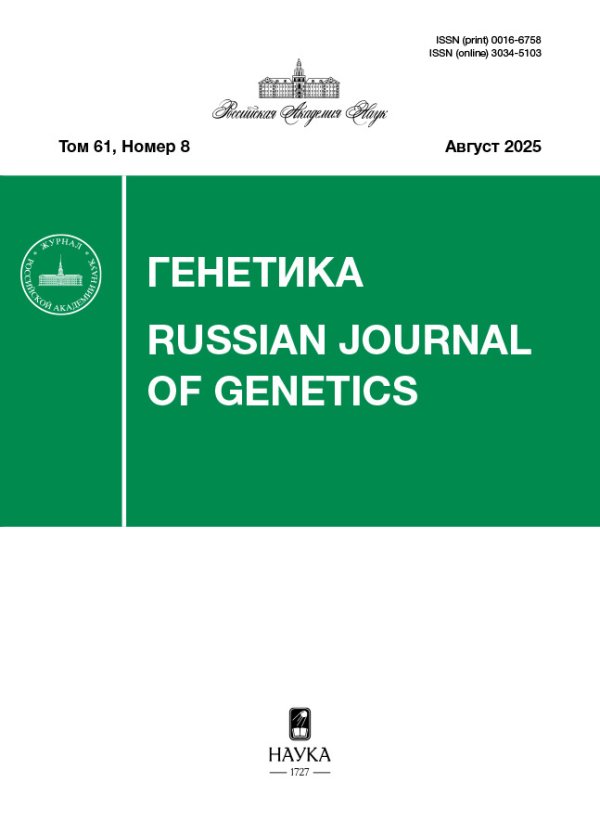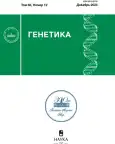Transcriptional Activity of CCA 1 in Northern Population Arabidopsis thaliana Plants under Altered Light Conditions
- Authors: Zaretskaya M.V.1, Fedorenko О.M.1
-
Affiliations:
- Institute of Biology of Karelian Research Centre Russian Academy of Sciences
- Issue: Vol 60, No 12 (2024)
- Pages: 36–42
- Section: ГЕНЕТИКА РАСТЕНИЙ
- URL: https://rjsvd.com/0016-6758/article/view/676593
- DOI: https://doi.org/10.31857/S0016675824120046
- EDN: https://elibrary.ru/warncq
- ID: 676593
Cite item
Abstract
The dynamics of the transcriptional activity of one of the key genes of the circadian network, CCA1, was analyzed under conditions of a natural light photoperiod of a long day (16L : 8D) and under an inverted light regime (8D : 16L) in A. thaliana plants of the northern natural population (Karelia). It has been shown that under conditions of an inverted shift in the light regime, there is a sharp increase in the expression of this gene with a phase shift in the circadian rhythm by 2 hours. The level of CCA1 transcriptional activity was almost two times higher compared to the natural light conditions. At the same time, the endogenous rhythm of the gene was preserved, but with a smaller amplitude. With age, 30-day-old plants grown under inverted conditions experienced a loss of endogenous CCA1 circadian rhythm. The results obtained allow us to conclude that the circadian rhythms of A. thaliana, northern natural populations, probably play an important role in adaptation to changing light conditions, and that one of the key clock genes, CCA1, plays a significant role in this process.
Full Text
About the authors
M. V. Zaretskaya
Institute of Biology of Karelian Research Centre Russian Academy of Sciences
Author for correspondence.
Email: genmg@mail.ru
Russian Federation, Petrozavodsk, 185910
О. M. Fedorenko
Institute of Biology of Karelian Research Centre Russian Academy of Sciences
Email: fedorenko_om@mail.ru
Russian Federation, Petrozavodsk, 185910
References
- Zhu Z., Quint M., Anwer M.U. Arabidopsis EARLY FLOWERING 3 controls temperature responsiveness of the circadian clock independently of the evening complex // J. Exp. Bot. 2022. V. 73. № 3. P. 1049–1061. https://doi.org/10.1093/jxb/erab473
- Venkat A., Muneer S. Role of circadian rhythms in major plant metabolic and signaling pathways // Front. in Plant Sci. 2022. V. 13. https://doi.org/10.3389/fpls.2022.836244
- Ueda H.R. Systems biology flowering in the plant clock field // Mol. Syst. Biol. 2006. V. 2(60). https://doi.org/10.1038/msb4100105
- Yamashino T., Ito S., Niwa Y. et al. Involvement of Arabidopsis clock-associated pseudo-response regulators in diurnal oscillations of gene expression in the presence of environmental time cues // Plant Cell Physiol. 2008. V. 49(12). P. 1839–1850. https://doi.org/10.1093/pcp/pcn165
- Ronald J., Davis S.J. Making the clock tick: The transcriptional landscape of the plant circadian clock // F1000Res. 2017. V. 6(951). https://doi.org/10.12688/f1000research.11319.1
- Flis A., Fernández A.P., Zielinski T. et al. Defining the robust behaviour of the plant clock gene circuit with absolute RNA timeseries and open infrastructure // Open Biol. 2015. V. 5(10). https://doi.org/10.1098/rsob.150042
- Linde A.M., Eklund D.M., Kubota A. et al. Early evolution of the land plant circadian clock // New Phytol. 2017. V. 216. P. 576–590. https://doi.org/10.1111/nph.14487
- Suárez-López P., Wheatley K., Robson F. et al. G. CONSTANS mediates between the circadian clock and the control of flowering in Arabidopsis // Nature. 2001. V. 410(6832). P. 1116–1120. https://doi.org/10.1038/35074138
- Sugiyama H., Natsui Y., Hara M. et al. Late flowering phenotype under ultra-short photoperiod (USP) in Arabidopsis thaliana // Plant Biotechnology. 2014. V. 31(1). P. 29–34. https://doi.org/10.5511/plantbiotechnology.13.1104a
- Rees H., Joynson R., Brown J.K.M. et al. Naturally occurring circadian rhythm variation associated with clock gene loci in Swedish Arabidopsis accessions // Plant Cell Eniron. 2021. V. 44. P. 807–820. https://doi.org/10.1111/pce.13941
- Anwer M.U., Davis A., Davis S.J., Quint M. Photoperiod sensing of the circadian clock is controlled by EARLY FLOWERING 3 and GIGANTEA // Plant J. 2020. V. 101(6). P. 1397–1410. https://doi.org/ 10.1111/tpj.14604
- Sawa M., Kay S.A. GIGANTEA directly activates FLOWERING LOCUS T in Arabidopsis thaliana // Proc. Natl Acad. Sci. USA. 2011. V. 108. P. 11698–11703. https://doi.org/10.1073/pnas.1106771108
- Salathia N., Davis S.J., Lynn J.R. et al. FLOWERING LOCUS C-dependent and -independent regulation of the circadian clock by the autonomous and vernalization pathways // BMS Plant Biol. 2006. V. 6. № 10. https://doi.org/10.1186/1471-2229-6-10
- Nitschke S., Cortleven A., Iven T., Feussner I. et al. Circadian stress regimes affect the circadian clock and cause jasmonic acid-dependent cell death in ctokinin-deficient Arabidopsis plants // Plant Cell. 2016. V. 28(7). P. 1616–1639. https://doi.org/10.1105/tpc.16.00016
- Иванов В.И., Касьяненко А.Г., Санина А.В. и др. Краткая характеристика A. thaliana и некоторые сведения о его культивировании, технике скрещиваний и учете изменчивости // Генетика. 1966. Т. 8. № 1. С. 115–120.
- Livak K.J., Schmittgen T.D. Analysis of relative gene expression data using real-time quantitative PCR and the 2–∆∆Ct method // Methods. 2001. V. 25. P. 402–408. https://doi: 10.1006/meth.2001.1262
- Квитко К.В., Мюллер А. Новый объект для генетических исследований – Arabidopsis thaliana (L.) Heynh. // Исследования по генетике. Т. 1. Л.: Изд-во ЛГУ. 1961. С. 79.
- Fujiwara S., Oda A., Yoshida R. et al. Circadian clock proteins LHY and CCA1 regulate SVP protein accumulation to control flowering in Arabidopsis // Plant Cell. 2008. V. 20(11). P. 2960–2971. https://doi: 10.1105/tpc.108.061531
- Millar J., Carrington J.T., Tee W. et al. Changing planetary rotation rescues the biological clock mutant lhy cca1 of Arabidopsis thaliana // bioRxiv. 2015. https://doi.org/10.1101/034629
Supplementary files















